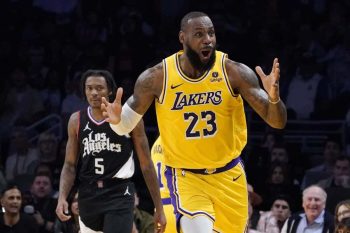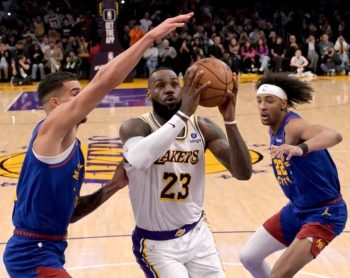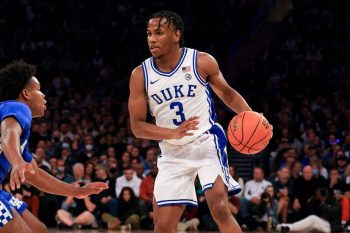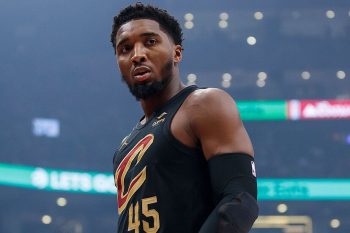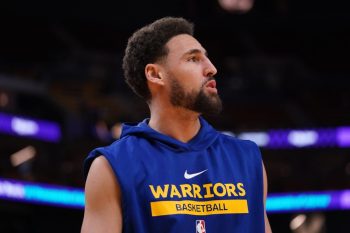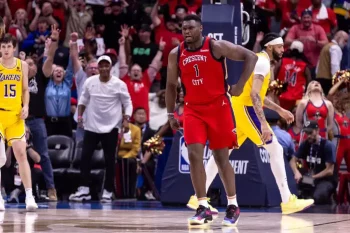NBA
NBA PM: One on One With Myles Turner
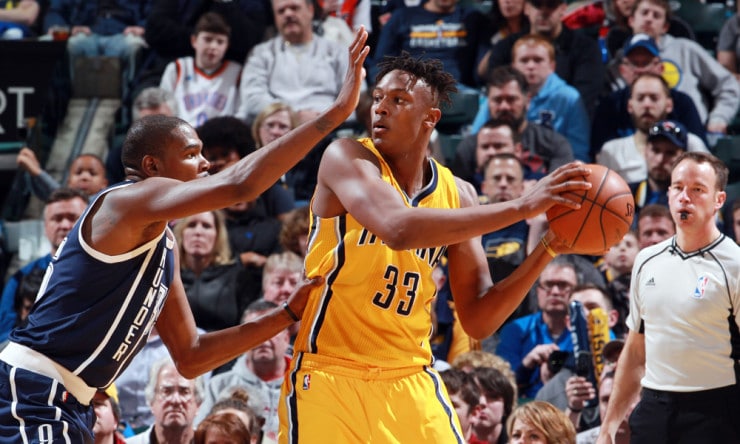
One on One With Myles Turner
With the 11th pick in this year’s draft, the Indiana Pacers selected a player with ridiculous upside. There was a lot of talk about Myles Turner’s potential and how he could develop into the type of big man that NBA executives are in love with these days. However, what some pundits didn’t realize is that the 20-year-old was capable of making an immediate impact.

He’s one of only seven rookies averaging double figures in points (and the only one of those seven currently whose team is in the playoff picture). He also ranks third in the class in blocks per game. Turner has become a significant contributor for the Pacers, who currently have a 41-36 record and occupy the seventh seed in the Eastern Conference. I recently caught up with Turner for in-depth interview:
Basketball Insiders: How much have you learned throughout the course of this season?
Myles Turner: “I’ve learned a whole lot. Just being around these guys, being around the league and seeing stuff that happens on the court and off the floor, I’ve just learned a lot more this year than I expected. It’s a lot to take in, but I feel like I’m doing well adjusting. I’ve learned a lot about schemes and the need for unique players and a lot about different styles of offenses and what it takes to guard the best players in the world night in and night out.”
BI: Were there any particular players who were tough to match up against? At the start of this season, Los Angeles Lakers power forward Larry Nance Jr. told me some of the experienced role players, like Toronto Raptors power forward Luis Scola, were the toughest for him because of their strength and array of moves. Anyone stand out for you?
Turner: “Yeah, there’s a couple. My toughest match-up of the year was probably guarding DeMarcus Cousins because he is just so big and agile and he does a lot of different things. That was my first real tough match-up. Then, I’ve been cross-matched a couple of times with guys like Kevin Durant, you know? KD was one of my favorite players and I’ve played against him a few times, so he’s always a tough cover. Then, transitioning and playing more four than I have before, I was guarding a lot of these faster perimeter guys like Marvin Williams of Charlotte. He had a heck of a game, just because a lot of the stuff I was doing when I first was playing was more in the paint, so I didn’t really know where to be position-wise so he got a lot of shots up. Those three really stick out to me the most this year.”
BI: Now that you’re playing against NBA players, it’s even easier to take bits and pieces of other players’ skill set and add them to your own arsenal. Which players, on or off your team, have you learned from?
Turner: “I mean, some of the guys on my team like Jordan Hill. I think he’s deadly in the post. Man, he’s a heck of a player down there – he bodies everyone at practice, and just seeing what he does in the game [has helped me]. I love his footwork and it’s almost very nonchalant how he plays, but that’s what might throw you off and it’s just funny to me; I’ve learned a lot of stuff from Jordan Hill this year. Ian Mahinmi is another guy I take some stuff from. It’s funny you mention Luis Scola because I love watching him play because he gets the job done and just hurts you in so many different areas. I watched some of the stuff that he did when he played against us. Al Jefferson too. When we played Charlotte, I just kind of keyed in on some of the stuff that he was doing.”
BI: You’ve now played in 55 games and started 29 contests. How much more comfortable and confident are you when you’re on the floor?
Turner: “The confidence is definitely starting to grow more and more since the beginning of the season. Watching all the film and going through it in the game, it’s like my mind just takes me there now. In the beginning of the season, I was trying to figure it out and now it’s just like I automatically do it. I’ve adapted and adjusted a lot faster than I thought I would, so it’s definitely coming a lot easier just because of how natural I can do things now.”
BI: Before the draft, people talked about you having a lot of potential, but you’ve made a day-one impact with Indiana. At that time, there were also some people who doubted you and questioned your NBA readiness and even your running style. How does it feel to play this well after hearing all of that?
Turner: “Man, I’ll tell you I absolutely love it – just coming out here and proving people wrong. That’s one of my favorite parts about this game, going out there and doing things people said you can’t do. The fact that I’ve had an impact and just seeing the way people have kind of turned their head toward me is definitely something I’ve taken some notice of. Not too much, but I do pay attention though. You are going to have on and off nights and people are going to say what they want about you. But that is one thing that I definitely took a lot of pride in this year, proving a lot of doubters wrong from the draft [process].”
BI: What’s been the hardest part of your transition from college to the NBA?
Turner: “Definitely the physicality of the game; it’s a lot different than college. The refs don’t blow the whistle as often, they let you play through a lot of stuff. When the refs do blow the whistle often, you are going to get a lot of calls on you for being a rook – a lot of bogus calls, so that’s one thing I’ve had to adjust to as well. That’s not going to last too much longer though; well, hopefully not. The travels tough too though. The traveling definitely takes a toll on your body. About three to four weeks ago, I just found out I hit a little bit of a wall – being so tired all of the time, not really wanting to move, not wanting to practice. I’m over it now, of course, but my wall was a little different. I hit it a little later in the season because I missed all of those games and stuff. When all of the other rookies were hitting their walls, that’s when I was kind of just getting started and had all of that energy and stuff like that. Yeah, so I’ve learned to adjust to the travel, learned to get my rest. You have to manage your rest better than you did in college and you have to really manage your off-court stuff too. When you’re not practicing you’re doing this appearance or you’re signing these autographs or XYZ. Managing your personal life is a big thing that I heard about in college, but now it’s definitely different when you are living it.”
BI: How difficult was it for you to be sidelined due to injury for a chunk of the season?
Turner: “It was very frustrating because when we started losing some games, I saw some stuff out there where I really thought I could have helped and stuff out there that I really could have done [to help] defensively and a little bit offensively as well. Also, it was just rough not establishing myself with my teammates yet. I had missed a little bit of training camp because of I had to rest my knee a bit and then in the beginning of the year I had some soreness from Summer League, but that’s long gone now and trainers have done a good job with me. But at that point, it’s almost like I look like a prima donna to my teammates. You have to prove yourself to your teammates and that’s very important because those are the guys you are going to war with. If they can’t trust you to go out there and fight with them, then you are already losing the battle. Establishing the trust of my vets was something I had to do.”
BI: When did you feel like you had established that trust with your veteran leaders?
Turner: “I think I got it in practice when I came back. Some of the guys were resting and what not because we were at that point in the season, but I was just going so hard in practice and going so hard in the four-on-four stuff and five-on-five stuff. I think that’s when I started to earn the trust. I was staying late at night working, shooting in the gym at like 2 or 3 a.m. I’d be in the gym two hours before practice, that kind of stuff. I think that’s when I started earning the trust of my teammates.”
BI: You guys are fighting for playoff positioning in the Eastern Conference. How intense are things right now?
Turner: “Man, it’s really intense right now. It’s a dog fight, especially in the East right now with everyone’s record being so close, but I wouldn’t want it any other way. I’m getting that experience of the playoff intensity before the playoffs even get here. I always hear ‘playoff intensity this, playoff intensity that, everything is so different in the playoffs’ and now I’m kind of starting to see that. It’s really cool and I’m blessed to be one of the rookies to be in the position to do this right now early in my career. It’s definitely a whole different atmosphere and whole different vibe because everybody plays so much harder because a lot is on the line.”
BI: How much have you learned from Coach Frank Vogel?
Turner: “It’s been incredible and I have learned, like, light years of information from him. I’ve learned a lot defensively, especially during that time I was out watching a bunch of film and everything. I’ve definitely added a lot of stuff to my game and I’ve taken a lot of strides since my freshman year of college [last year]. I’ve learned a lot and the coaches have definitely done a great job with me to this point.”
The Pacers have five games left in the season – three at home and two on the road.
NBA Announces Players of the Month
The Cleveland Cavaliers’ LeBron James and the Oklahoma City Thunder’s Russell Westbrook today were named the Kia NBA Eastern and Western Conference Players of the Month, respectively, for games played in March.
James ranked second in the East in scoring (25.6 ppg) and fifth in assists (7.1 apg) as the Cavaliers went 11-5 for the month (10-4 with James in the lineup). He added 8.2 rebounds and shot 53.8 percent from the field. James was the only player in the NBA to average at least 25.0 points, 8.0 rebounds and 7.0 assists in March. He posted seven double-doubles and recorded two triple-doubles. In a 107-87 win over the Brooklyn Nets on March 31, James scored 24 points to move into 12th place on the NBA’s all-time scoring list (he is now 11th).
Westbrook led the Thunder to an 11-5 record behind averages of 21.7 points, 10.6 assists (third in the NBA) and 8.3 rebounds. His seven triple-doubles in March were the most in a calendar month since Michael Jordan had seven in April 1989. Those performances increased Westbrook’s season total to 16 triple-doubles, the most since Magic Johnson had 17 in 1988-89. Westbrook scored at least 20 points in 11 of 16 games for the month and logged nine games with double-digit assists, including a career-high 19 in a 120-109 win over the Clippers on March 9.
Other nominees for the Kia NBA Eastern and Western Conference Players of the Month were Atlanta’s Paul Millsap, Boston’s Isaiah Thomas, Charlotte’s Kemba Walker, Dallas’ Dirk Nowitzki, Golden State’s Stephen Curry and Klay Thompson, Houston’s James Harden, Miami’s Hassan Whiteside, Oklahoma City’s Kevin Durant, Portland’s Damian Lillard, San Antonio’s LaMarcus Aldridge and Kawhi Leonard, and Toronto’s DeMar DeRozan.
